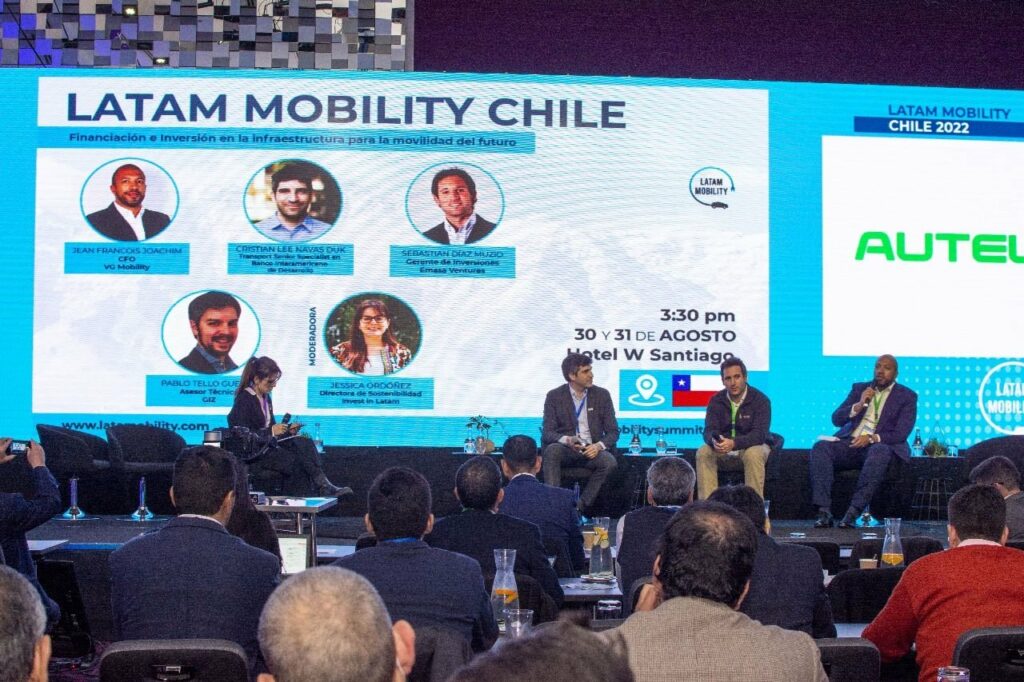
VG Mobility, Emasa and the IDB Introduced Key Investments for the Future of “Mobility at Latam Mobility: Chile 2022”

The economic sphere is part of the challenges that smart mobility still has to face due to the skepticism towards new technologies, which are still very costly. However, more and more companies and authorities around the world are realizing that it is possible to have environmentally friendly innovations that are also profitable.
In this context, Latam Mobility: Chile 2022, a meeting that brought together leaders from the public and private sectors, was the setting for the panel “Financing and Investment in infrastructure for the mobility of the future”, in which ideas were exchanged on how to facilitate access to resources for the development of projects.
On these issues, Cristian Navas, Senior Transport Specialist of the Inter-American Development Bank (IDB), pointed out that since before the electric mobility boom, the institution has played a leading role in the sources of financing for sustainable transport with the aim of accelerating the energy transition.
He explained that the institution has ambitious projects in the pipeline, such as financial support for the inclusion of more electric buses in Chile’s vehicle fleet. He also revealed that they are working on financial support for the Bogota subway plan and the renovation of the corridors in Curitiba, Brazil, among others.
Related content: Chilexpress, Falabella.com, Spread and Zipline Set Out Sustainable Mobility Strategies to Boost Decarbonization of Last-Mile Deliveries
In addition, they launched the “BID Lab” initiative, an innovation laboratory that will work to bring startups and corporations together to establish programs that support vulnerable sectors and at the same time are friendly to the planet.
“We are trying to be innovative with the goal of finding the formula to finance electromobility projects in the countries so that they become widespread, and we believe that this is something that could be promoted more in the short term,” said Navas.
Emasa, a Strategic Ally
The BID Lab project mentioned by Navas has the important support of the company Emasa Ventures, whose Investment Manager, Sebastián Díaz Muzio, was also part of the debate sponsored by Latam Mobility.
In addition to supporting the initiative led by the Inter-American Development Bank, Emasa has a strong relationship with startups to promote sustainable investments and accelerate internal innovation processes in companies.
Díaz said that the company, which started operations more than 60 years ago as an auto parts seller, has been able to adapt to the new times and enter the race to support the massification of sustainable mobility in Latin America.
Among the major projects on the agenda, the company will soon open the “Emasa Mobility Hub”, a building in Santiago de Chile that will be a meeting point for the mobility of the future with services and spaces equipped to develop technologies, such as a workshop specializing in electric cars and charging infrastructure.
VG Mobility and Investment Capacity
Regarding the difficulties that arise in the field of investments, the company VG Mobility emerges as a major player to finance large projects in the region, where they already have coverage in Colombia, Chile, Mexico and Brazil.
In this sense, the CFO of the company, Jean Francois, assured that they have no restriction of amounts to finance, since they do not depend on banking systems. He emphasized that one of the main characteristics of their operation is to invest in steps to contribute to the value chain, such as fleets, chargers or batteries.
“We have the capacity to take risks. In countries like Colombia and Chile there are many advantages because there are more robust financing systems with investor protection, which leaves limited loss margins,” explained Francois.
To close the Latam Mobility panel, the specialists concluded that in the region an important change is taking place to finance projects and they hope that by 2040-50 financing will not be a stumbling block to make the definitive leap towards carbon neutrality.





